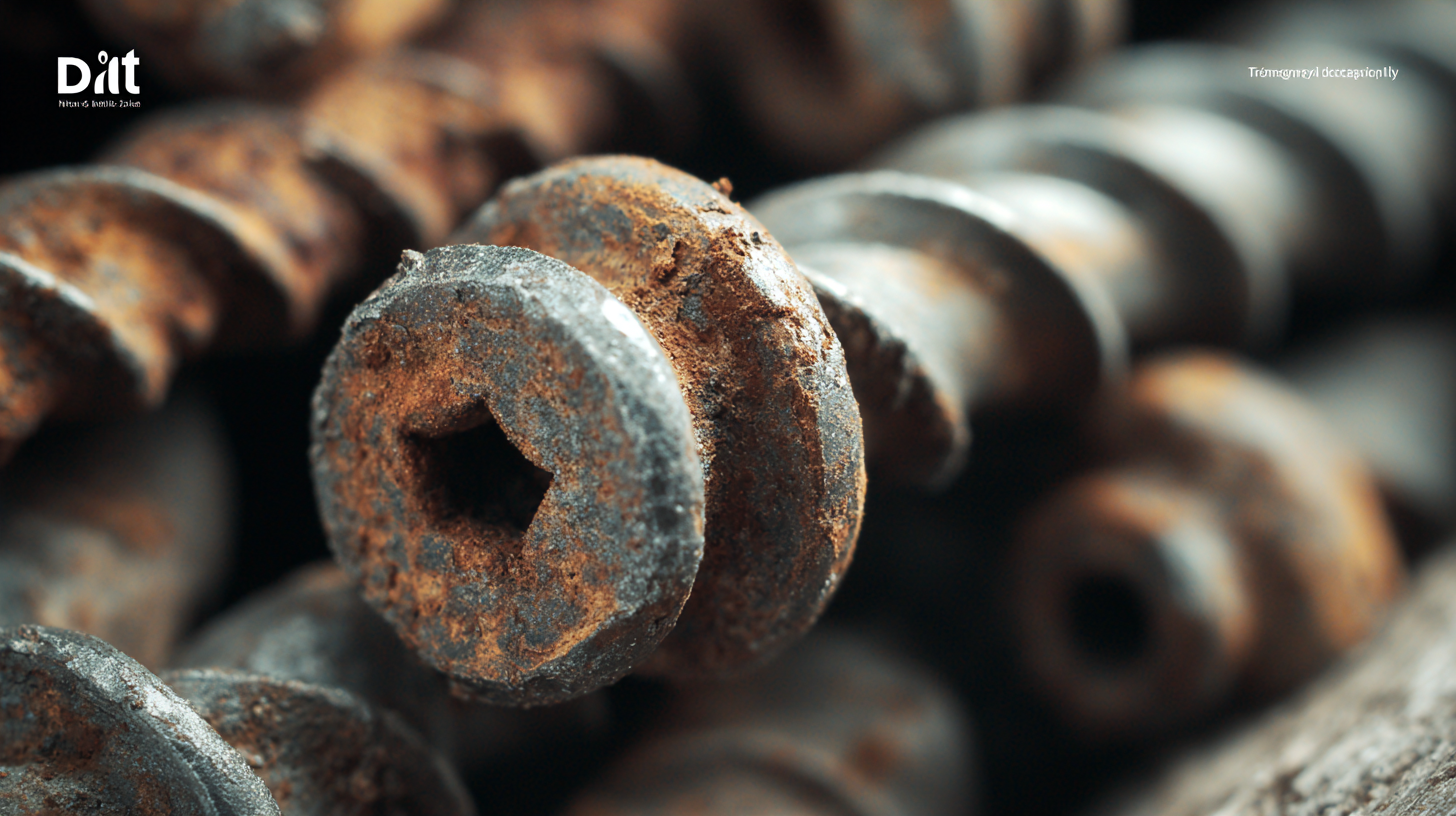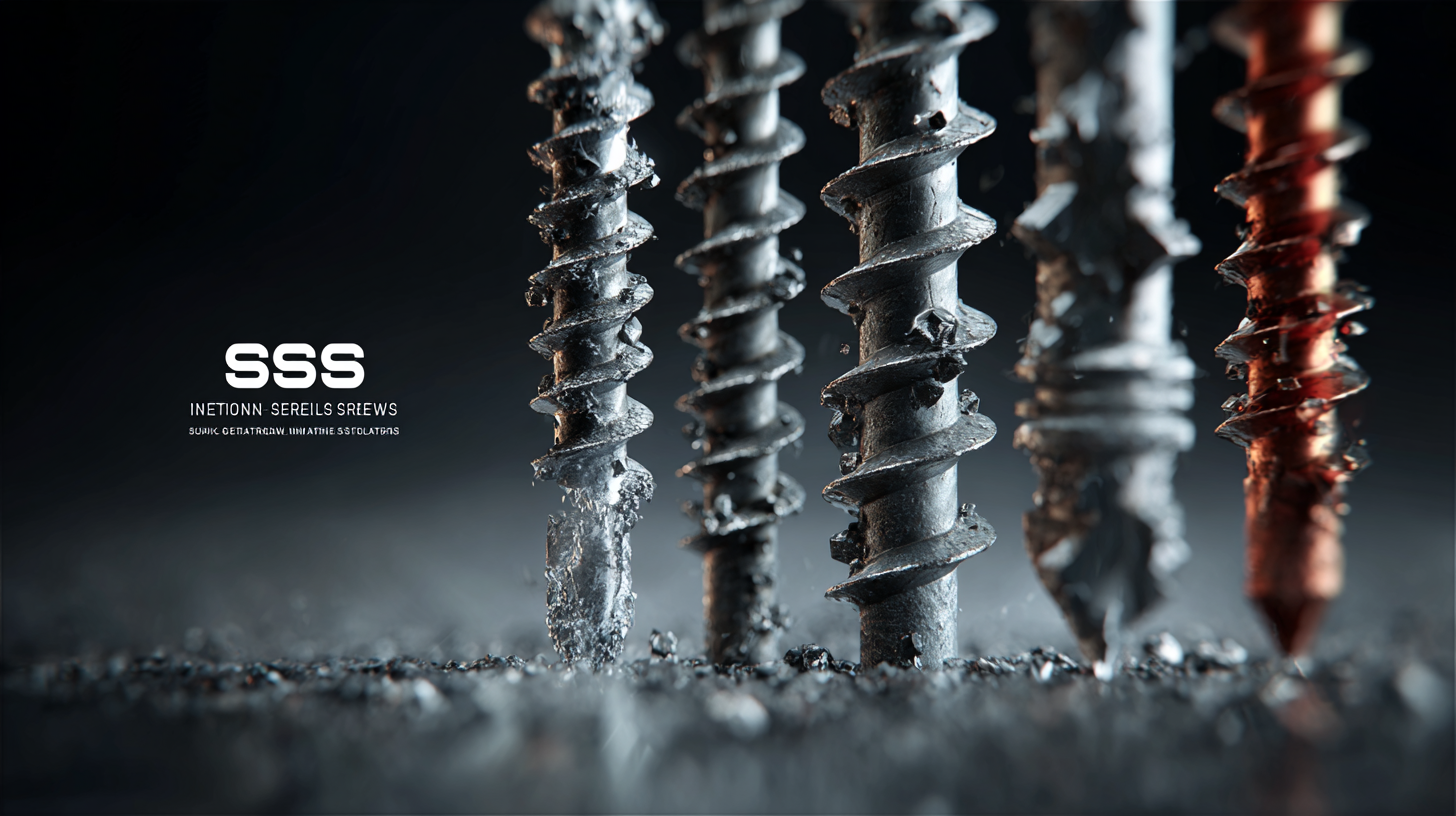
Top 5 Innovative Examples of Best Self-Drilling Screws Changing the Construction Industry
In recent years, the construction industry has undergone a significant transformation, largely driven by the adoption of innovative tools and materials. Among these advancements, Self-Drilling Screws have emerged as a game-changer, streamlining construction processes and enhancing structural integrity. According to a report by MarketsandMarkets, the global market for self-tapping screws, including self-drilling variants, is projected to reach USD 7.35 billion by 2026, growing at a CAGR of 4.5%. This surge in demand underscores the importance of these fasteners in modern building practices, where efficiency and precision are paramount. As we delve into the top five innovative examples of self-drilling screws, we will explore how these exceptional tools not only facilitate faster assembly and installation but also contribute to cost savings and improved safety standards within the industry.

Innovative Materials: How New Self-Drilling Screws Elevate Construction Durability
 Self-drilling screws have revolutionized the construction industry by introducing innovative materials that significantly enhance durability and efficiency. Traditional screws often required pre-drilling, leading to increased labor costs and time delays. However, with the advent of advanced self-drilling screw designs made from high-strength alloys and corrosion-resistant coatings, construction projects can now benefit from a streamlined installation process. These modern screws not only penetrate various substrates with ease but also ensure a robust hold, which is crucial for structural integrity.
Self-drilling screws have revolutionized the construction industry by introducing innovative materials that significantly enhance durability and efficiency. Traditional screws often required pre-drilling, leading to increased labor costs and time delays. However, with the advent of advanced self-drilling screw designs made from high-strength alloys and corrosion-resistant coatings, construction projects can now benefit from a streamlined installation process. These modern screws not only penetrate various substrates with ease but also ensure a robust hold, which is crucial for structural integrity.
Moreover, the development of self-drilling screws featuring eco-friendly materials highlights the industry's commitment to sustainability. By utilizing recycled metals and reducing waste during the manufacturing process, these screws contribute to greener building practices. Their superior resilience against environmental factors—such as moisture, temperature fluctuations, and chemical exposure—further solidifies their role in enhancing the longevity of structures. As these innovative screws continue to evolve, the construction industry will experience improved performance and reduced maintenance costs, paving the way for a more sustainable future.
Smart Design Features: Enhancing Efficiency with Self-Drilling Screw Technology
The construction industry has witnessed a significant transformation with the introduction of self-drilling screws, particularly due to their smart design features. These innovative screws integrate advanced technology that simplifies the fastening process, eliminates the need for pre-drilling, and enhances overall efficiency on job sites. By adapting to various materials, including metals and plastics, these screws ensure robust securing capabilities while reducing labor time.
When utilizing self-drilling screws, consider a few tips for maximizing their efficiency. Firstly, always choose the right type and size of screw for your specific project; matching the screw's specifications with the material can prevent stripping and improve durability. Secondly, pay attention to the screw's tip design, as different tip configurations offer distinct advantages for penetrating various substrates. A sharper tip can significantly reduce the effort needed to initiate drilling, making installations faster and more straightforward.
Additionally, incorporating self-drilling screws into your toolbox allows for flexibility in project execution. Use these screws for both structural and aesthetic applications; their sleek design not only enhances functionality but also contributes to the visual appeal of constructions. Experimenting with different materials and coatings can further optimize performance while ensuring longevity and resistance to environmental factors.

Applications in Modern Construction: Transforming Techniques with Self-Drilling Screws
Self-drilling screws have revolutionized modern construction, offering innovative solutions that significantly enhance efficiency and versatility. Unlike traditional screws, self-drilling screws eliminate the need for pre-drilling holes, allowing for quicker assembly and installation. This feature is particularly beneficial in applications involving metal-to-metal or metal-to-wood connections, where time-saving and precision are crucial. Contractors can now streamline their operations, minimizing labor costs and speeding up project timelines without compromising structural integrity.
Moreover, self-drilling screws are designed to accommodate various materials, making them ideal for diverse construction projects. From the erection of steel frameworks to the installation of lightweight cladding systems, these screws adapt seamlessly to different substrates. Their advanced design features, such as unique drill point geometries and specialized coatings, improve penetration efficiency and corrosion resistance. As a result, builders can ensure longevity and durability in their constructions, creating safer and more reliable structures in a rapidly evolving industry.
Quality Assurance: The Role of Top Chinese Factories in Global Production Standards
In the fast-evolving construction industry, the role of quality assurance, particularly from top Chinese factories, cannot be overlooked. As these factories strive to meet global production standards, they significantly contribute to enhancing the quality of self-drilling screws, which are vital in construction projects. China's push towards innovation, especially in manufacturing processes, has led to improvements in quality control measures that ensure products meet stringent international norms. This commitment to quality is crucial as it aids in the reduction of errors that are often prevalent in manufacturing processes.
Additionally, the advancements in digital transformation, exemplified by the introduction of systems designed to enhance quality assurance processes, reflect China's growing capabilities. While there are challenges in other sectors like robotics and semiconductors where China is still catching up, the focus on elevating quality standards in construction materials like self-drilling screws showcases China's determination to become a leader in high-quality manufacturing. This evolution not only benefits domestic industries but also positions Chinese manufacturers as key players in the global construction supply chain.
Top 5 Innovative Examples of Best Self-Drilling Screws Changing the Construction Industry
This chart represents the impact score of the top five innovative examples of self-drilling screws in the construction industry. The scores reflect their effectiveness and contribution towards the evolving standards set by leading factories, particularly in China.
Future Trends: What’s Next for Self-Drilling Screws in Construction Innovation
As the construction industry evolves, self-drilling screws are becoming increasingly central to innovative building techniques. The future trends indicate a shift towards enhanced materials and designs that promise to improve efficiency and sustainability. One major trend is the development of screws made from advanced, lightweight composites that not only reduce overall material costs but also minimize the environmental impact. These new materials enhance the durability and corrosion resistance of screws, making them suitable for diverse applications, from outdoor structures to high-stress industrial environments.
Another exciting trend is the integration of smart technology into self-drilling screws. With the advent of IoT, screws equipped with sensors can provide real-time data on structural integrity and environmental conditions. This advancement will enable construction teams to address potential issues before they escalate, reducing the need for extensive repairs and enhancing safety on job sites. As the industry embraces digital transformation, the role of self-drilling screws will likely expand, leading to more sophisticated building practices that prioritize efficiency, safety, and sustainability. The future of construction is undeniably intertwined with these innovations.
Top 5 Innovative Examples of Best Self-Drilling Screws Changing the Construction Industry
| Innovation Feature | Application Area | Material Used | Advantages | Future Trends |
|---|---|---|---|---|
| Self-Tapping Technology | Roofing | Galvanized Steel | Improves installation speed and reduces labor costs | Further automation through smart technology |
| Coating Enhancements | Metal Structures | Corrosion-Resistant Coatings | Longevity in extreme conditions | Sustainability and eco-friendly materials |
| Variable Thread Design | Wood Construction | High-Strength Alloys | Enhanced grip and reduced splitting in wood | Customization for specific applications |
| Integrated Washers | Facade Construction | Plastic and Metal Composites | Sealing against moisture and air | Smart sensors for real-time feedback |
| Eco-Friendly Materials | Green Building Projects | Recycled Steel | Lower environmental impact | Increased demand for sustainable options |
